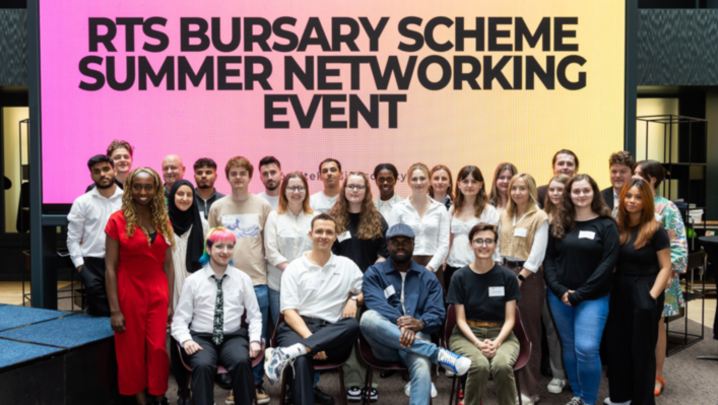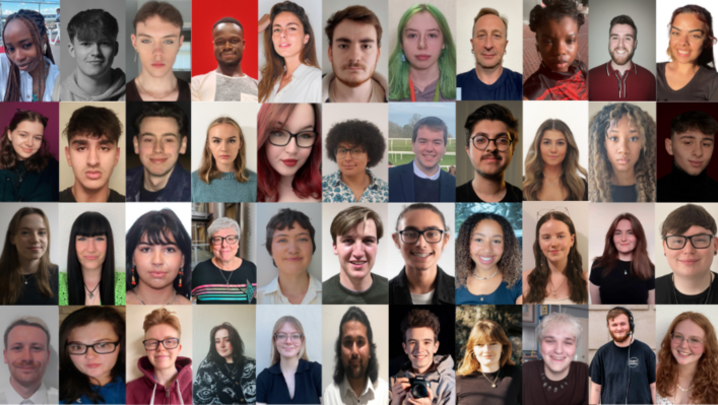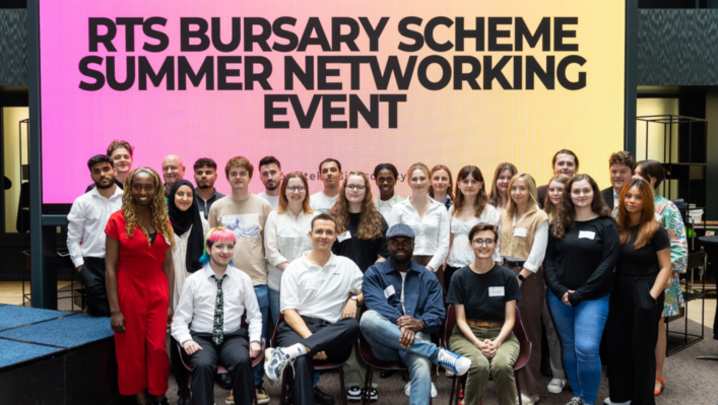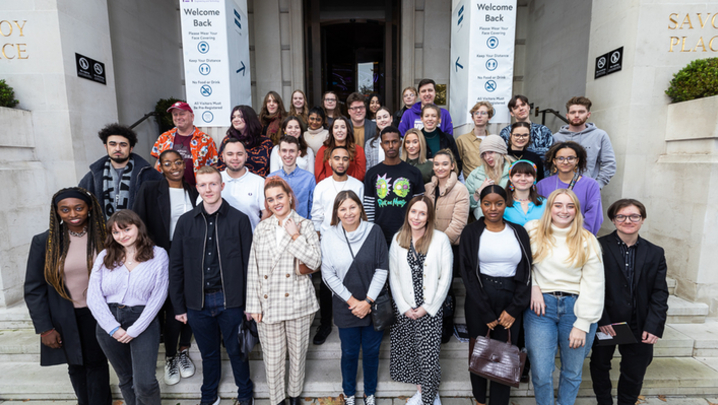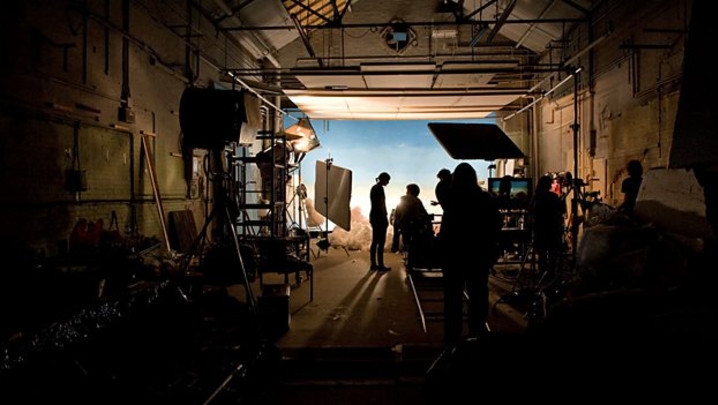SPEECH BY THE PRINCE OF WALES AT THE ROYAL TELEVISION SOCIETY'S TELEVISION CRAFT SKILLS MASTERCLASS, THE HOSPITAL CLUB, LONDON 30th October 2013
Ladies and gentlemen,
I can't tell you how pleased I am to join you as Patron of the Royal Television Society. I just must stress that I am not an expert in anyway, just an interested observer of the whole industry. And I have to confess at the start that this television craft skills masterclass is really all my fault – so if we can just get that out of the way to start with – which is probably yet another example of what The Guardian obligingly refers to as interfering, or meddling! But anyway there we are. But it has all stemmed from meeting a whole series of professionals over the years who have been involved in the making of various T.V. documentaries of one kind or another with which I have been associated. Observing their extraordinary technical skill and ingenuity made me realise just how much accumulated experience and training goes into producing the quality of production that has made British television rightly famous across the World.
Since I first became Patron of the Royal Television Society in November 1997, we have all seen enormous changes in television. Back then, there were no catch-up services, no HD, no red button and Channel 5 had only just been launched. And yet despite a background of unrelenting technological change, our television industry here in the UK has remained in good health. Indeed, last year alone, it generated around £17.5 billion - about one per cent of GDP.
Now I am pleased to say that in an increasingly complex and competitive world, traditional broadcasters are generally holding their own, while pay-to-view television has recently enjoyed a high increase in revenues with new entrants such as Netflix, YouTube and BT Vision all making their mark. And there's more good news. The UK is second only to America in the number of programmes we export, with such runaway international hits as Dr Who – and we visited the studios in Cardiff in the Summer, which was very jolly and I was reintroduced to the Daleks which I loved when I was very, very young - Top Gear, Downton Abbey and of course, my darling wife's very own favourite – Strictly Come Dancing!
But it isn’t just the commercial success of our television of which we should be rightly proud. We have also traditionally been known for the quality of our television output – from high end drama such as Broadchurch to extraordinary wildlife programmes such as Sir David Attenborough's "Africa".
None of these amazing programmes would have been possible, of course, without the immense talent of British writers, producers, directors and on-screen talent.
But there is also a hidden army of unsung heroes behind the cameras who are an equally important part of this success. Without the talent and sheer dedication of sound engineers, editors and directors of photography, to name but a few, these great programmes, which give pleasure to millions, would never make it onto our screens or, if they were broadcast, have the impact which they undoubtedly do.
This is where, unfortunately, Ladies and Gentlemen, the good news ends. A recent consultation with heads of production by the industry body "Creative Skillset" has highlighted significant skills shortages across all forms of production. In essence, there are too few designers, mixers, editors, costume supervisors, camera and boom operators and digital imaging technicians. Indeed "Creative Skillset" has calculated that of the 2,160 university leavers who recently entered the television industry, only 345 were employed in craft and technical roles – in other words just 16 per cent.
Well I'm afraid the future looks even worse. With the increasing trend for cross-over in the workforce between high-end television and feature film production, the demand for craft and technical skills is likely to rise significantly. So if we don’t plan to meet these future demands now, we will be ill-serving our television industry and minimising the employment opportunities for thousands of people.
Well, I first became aware of this problem while I was filming a Diamond Jubilee Tribute to The Queen with the acclaimed film director, John Bridcut - who somehow has managed to squeeze this event into his packed diary - with whom I have worked on a number of films and who, I am delighted to say, has joined us here today. So during various breaks in recording, which we were occasionally allowed, I was talking to John, together with his cameraman Jonathan Partridge and sound engineer Paul Paragon, and started to become aware of the skills shortage in the television industry.
One particular issue we discussed was the alarming trend in factual programmes to dispense with the services of a dedicated sound recordist, often due to pressure on budgets. The trouble is that people often think television is only about pictures. But, of course, even the most wonderful images cannot be sustained for long without accompanying sound – preferably recorded to the same high standards. The 'talkies' began 86 years ago this month, with the release of the film "The Jazz Singer" in October 1927, and the technology of sound recording has been evolving ever since. So I can only hope this expertise will never be taken for granted, or allowed to wither away, simply because of cost-cutting…
Now I have particular experience of this because when I was making a documentary about the composer, Sir Hubert Parry with John, I had the great pleasure of attending an orchestral rehearsal of his Fifth Symphony in Manchester, and - here's the point - our hard-worked sound recordist, Paul Paragon, managed – on his own – to record not only the orchestra (testing enough I would have thought in itself), but comments from the conductor while he was rehearsing, plus a whispered conversation between myself and a music professor as we listened at the back of the studio. The amazing thing was that when the recording of the orchestra in rehearsal was laid beside the final broadcast performance in the Royal Albert Hall, there was no detectable difference in sound quality. Now that's real professionalism, which I think we lose at our peril. It is, perhaps, interesting to note that Paul went on to win the award for Sound Recordist of the Year…
Well, ladies and gentlemen, some people by now have probably learnt that it is dangerous to tell me about a problem unless they want me to do something about it! Therefore I was delighted that Theresa Wise, Chief Executive of the RTS, was open to the idea of providing an opportunity to highlight the craft skills shortage and offer some training and even more thrilled both by the response to the masterclass – with hundreds of students wishing to apply, thank God as it would have been very embarrassing if there weren't very many wishing to apply! – and by the extraordinary calibre of speakers who have been willing to participate in the masterclass.
So ladies and gentlemen, over the course of the next few hours, you will be lucky enough to hear from BBC Trustee David Liddiment, BBC Director of Television Danny Cohen, the chief executive of FreemantleMedia, Cecile Frot-Coutaz, Sophie Turner-Laing, Managing Director of Content for BskyB, technicians from the X Factor and The Voice, an editor of Panorama, a cinematographer for high end drama and a wildlife film-maker. It really is wonderful that they are all here and I, for one, could not be more grateful to them.
And ladies and gentlemen, I am also delighted to be able to announce today, as Patron, that the Royal Television Society is extending its educational remit with the launch of twenty new bursaries – I didn't know they could afford it, that's rather marvellous! - available to students studying television production and related digital media at accredited British universities. These bursaries are targetted at students in less affluent circumstances and are aimed at widening participation in our media and related industries. In addition, while they are studying, the recipients of the new bursaries will receive free membership of The Hospital Club – to which I am most grateful for hosting us today - as well as one year’s free membership of the Royal Television Society once they graduate.
But it was the late, lamented David Frost who once said "Television is an invention that permits you to be entertained in your living room by people you wouldn't have in your home."
It was a jolly good joke like many of David's jokes, but I think the point David was making is that television is an incredibly powerful medium which, at the touch of a button, can engage all of us in the widest possible range of information and experience.
With this power, however, comes responsibility and so I do hope that everyone involved in television, in whatever way, can do all they can to continue to commission and make the very highest quality television programmes here in the United Kingdom. I hope then, that today's craft skills masterclass – which I am assured will become an annual event – will play some small part in helping to achieve that. Thank you ladies and gentlemen.



